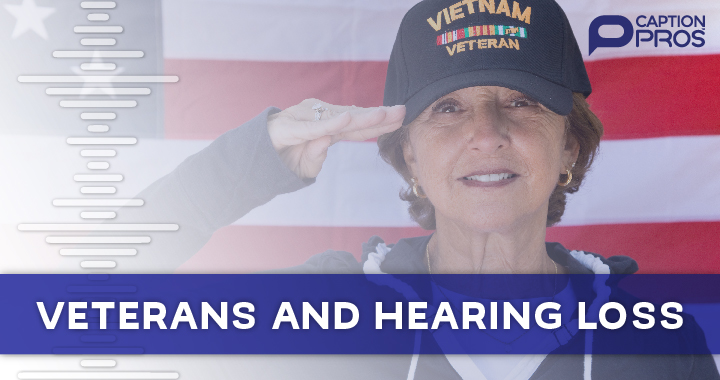Soldiers face countless occupational hazards. They must be ready for anything, including bombs and blasts, and often work around loud machinery.
As a result, tinnitus and hearing loss are the leading service-related disabilities among veterans. This silent injury is due to excessive noise exposure related to gunfire, explosions, tanks, and loud helicopters and aircraft.
Tinnitus is a ringing or buzzing in the ears, and hearing loss can get worse over time. Both interfere with daily activities such as dinner conversations, work and school, meetings, sleeping, and concentration.
However, there is help available. The VA can provide hearing aids and other support to veterans at no cost, and captioning services are an underutilized resource to improve accessibility for veterans.
Veterans and Hearing Loss by the Numbers
According to the Hearing Health Foundation:
- In 2017, 1.79 million veterans received disability compensation for tinnitus and 1.16 million received compensation for hearing loss.
- Many veterans who score normally on hearing tests have trouble understanding speech. This condition, auditory processing disorder or central auditory processing disorder (CAPD), is often associated with blast exposure.
- A study in 2015 found that 72% of veterans with tinnitus also had a diagnosis of anxiety, 60% had depression, and 58% had both conditions.
- Veterans were 30% more likely to have severe hearing impairment (SHI) than nonveterans after adjusting for age and current occupation. And those who served in the United States or overseas between September 2001-March 2010, including Operation Enduring Freedom and Iraqi Freedom, were four times more likely than nonveterans to have SHI, according to a 2011 report.
Military personnel who operate or work on aircraft, combat vehicles, or spend extended periods around other loud machinery and artillery have a higher risk of developing hearing problems. Regardless, all soldiers, especially while training for combat situations or actively deployed, should take preventative measures to protect their precious ears.
There are a variety of ways they can reduce occupational exposure without compromising safety:
- Earplugs: Level-dependent earplugs use a filter that eliminates high-frequency or impulse noise but allows soft noises to come through at full strength.
- Earmuffs: Earmuffs create an airtight barrier around the entire ear and work well for intermittent exposure to noise. They also provide warmth, comfort, and are more durable than earplugs.
- Noise-Attenuating Helmets: Besides protecting against hearing loss, these helmets reduce crash impact and eye injury while increasing communication through radio communication.
- Suppressors: These can reduce noise from gunfire by more than 30 decibels and have tactical and medical benefits. In 2017, the U.S. Marines began using suppressors on service weapons.
Some hearing loss can be reversed through surgery or medication. Other treatment options for hearing loss include hearing aids and cochlear implants. For tinnitus, ear-level devices that emit relaxing tones, a white-noise machine or fan can help mask the ringing. According to real-life veterans’ stories, many veterans soldier on and don’t report or seek treatment for signs of hearing loss. And many suffer in silence out of embarrassment, pride, or feeling worse for a comrade who lost a limb.
One Iraqi Freedom veteran wrote about his combat-related hearing loss and how it permeated all aspects of his daily life for The Washington Post. After six years, he finally sought help – and heard the birds chirp again.
Caption Pros celebrates veterans and is dedicated to helping improve accessibility for people with hearing loss. We provide a variety of captioning services for large and small conferences, public meetings, educational settings, webcasts and more. Visit Caption Pros to learn more about our award-winning captioners and make your next event accessible to all participants by adding real-time captioning.







